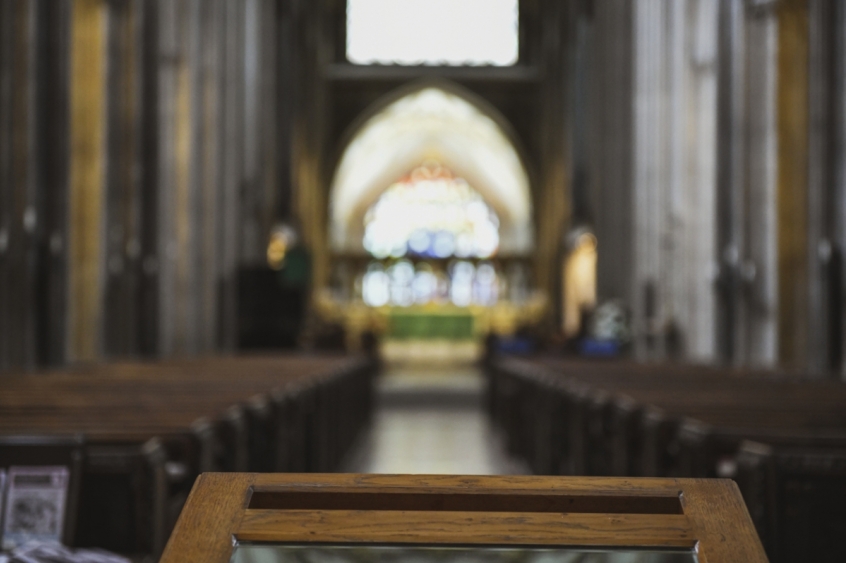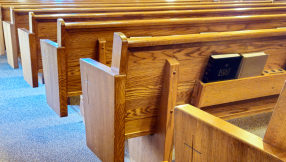
The Bible has some interesting, and for some people surprising, things to say about being religious. This is the story ...
Meaning of Religious
The word 'religious' can mean different things to different people. For many people being religious means having a faith and practising it. When some people are seen as being religious it is seen in a positive light, especially when they are loving, wonderful people who help others in the community. However people outside the Church, and even sometimes inside it, see being religious in a negative light as being dogmatic and judgemental.
In colloquial English the word 'religious' has come to mean doing something regularly because you feel you have to, or because it is a matter of habit or belief. For example we might say 'he religiously watches his local team every Saturday' or 'she does her exercises religiously'.
For people of faith, being religious is often associated with attending a place of worship, usually once a week, whether that is a church or chapel, synagogue, mosque or temple. People are also seen as religious if they wear a religious symbol or clothing such as a cross, skullcap or hijab. Actually the Bible has some surprising things to say about being religious.
Isaiah
In the book of Isaiah, he says, 'I'll tell you what it really means to worship the LORD.' He then goes on to say, 'Remove the chains of prisoners who are bound unjustly. Free those who are abused! Share your food with everyone who is hungry; share your home with the poor and homeless. Give clothes to those in need; don't turn away your relatives' (Isaiah 58:6-7 CEV). Then he says, 'Don't mistreat others or falsely accuse them or say something cruel. Give your food to the hungry and care for the homeless' (Isaiah 58:9-10 CEV). Isaiah explains that this is what it means to worship God.
Amos
In the book of Amos, it says, 'I hate, I despise your religious festivals; your assemblies are a stench to me. Even though you bring me burnt offerings and grain offerings, I will not accept them. Though you bring choice fellowship offerings, I will have no regard for them. Away with the noise of your songs! I will not listen to the music of your harps' (Amos 5:21-23 NIV).
This sounds rather surprising but then it goes on to say: 'But let justice roll on like a river, righteousness like a never-failing stream!' (Amos 5:24 NIV). The point is that religious ceremonies are worthless unless the religion is put into action. If the people were not being just and righteous then, in that case, God would not like their religious festivals.
Micah
In the book of Micah, he asks the rhetorical questions: 'With what shall I come before the LORD and bow down before the exalted God? Shall I come before him with burnt offerings, with calves a year old? Will the LORD be pleased with thousands of rams, with ten thousand rivers of oil? Shall I offer my firstborn for my transgression, the fruit of my body for the sin of my soul?' (Amos 6:6-7 NIV).
The answer is then given, 'He has shown you, O mortal, what is good. And what does the LORD require of you? To act justly and to love mercy and to walk humbly with your God' (Micah 6:8 NIV).
Jesus
In the New Testament we see that Mary and Joseph observed the religious rites with Jesus who was taken to the Temple as a child, circumcised and dedicated. Later he was baptised by his relative John the Baptist. Jesus attended the synagogue and the Temple himself and observed religious festivals.
He does not condemn being religious in this sense, but we see that Jesus did not like religious hypocrisy. He did not like it when it was just show. He overthrew the tables in the Temple when the religious authorities were abusing their power financially. Jesus did not like the legalism of the Pharisees. He warned people from judging others (Matthew 3:1-3).
Paul
In Acts, St Paul went to Athens and stood up at a meeting of the Areopagus and said: 'People of Athens! I see that in every way you are very religious. For as I walked around and looked carefully at your objects of worship, I even found an altar with this inscription: To an unknown god' (Acts17:22-23 NIV). They were religious, but their religious worship was misdirected. He did not condemn them for being religious but he tried to redirect their worship and explained who that unknown god was.
Which religious festivals are partaken of are a choice. In his letter to the Colossians St Paul wrote, 'Therefore do not let anyone judge you by what you eat or drink, or with regard to a religious festival, a New Moon celebration or a Sabbath day' (Colossians 2:16). In Romans 14, St Paul says that Christians should hold their own views with good conscience, and not judge our fellow believers because they think differently.
James
In his epistles, James echoes some of the words of the prophets. James was Jesus's own brother who became leader of the church at Jerusalem, so his words hold authority. He asks in his letter: 'Do any of you think you are religious? If you do not control your tongue, your religion is worthless and you deceive yourself' (James 1:26 GNB). He then explains, 'What God the Father considers to be pure and genuine religion is this: to take care of orphans and widows in their suffering and to keep oneself from being corrupted by the world' (James 1:27 GNB). By 'orphans and widows' we can include the homeless, the hungry, refugees, asylum seekers, the unemployed, single parents, the abused and others. Later James explains that faith without actions is meaningless (James 2:26).
The Message phrases it like this: 'Anyone who sets himself up as "religious" by talking a good game is self-deceived. This kind of religion is hot air and only hot air. Real religion, the kind that passes muster before God the Father, is this: Reach out to the homeless and loveless in their plight, and guard against corruption from the godless world' (James 1:26-27 The Message).
Being religious
So in the Bible, being religious can mean performing religious duties, but it is more than that. Too often people view many of those of faith as religious because they are being narrow-minded, legalistic, dogmatic and judgemental. This is a negative way of being religious.
Rather, for Christians, the Bible explains that being religious is about being humble, caring for others, showing hospitality, standing up for justice, and keeping a holy lifestyle. It can be summarised as the need to care for others, share with others, bear with others, and being fair to others. This is a positive way of being religious.
What God considers to be religious
To be truly religious in God's eyes we are required not to be judgemental, intolerant, dogmatic and legalistic. Rather Amos said that we are required to 'let justice roll on like a river, righteousness like a never-failing stream'. Micah said that we are required to 'act justly and to love mercy and to walk humbly' with our God. James wrote that 'What God the Father considers to be pure and genuine religion is this: to take care of orphans and widows in their suffering and to keep oneself from being corrupted by the world' (James 1:26-27 GNB).
The way we are religious can make all the difference to whether others are attracted or repelled by our religion.













